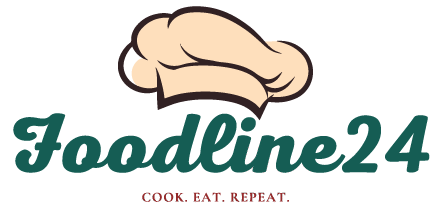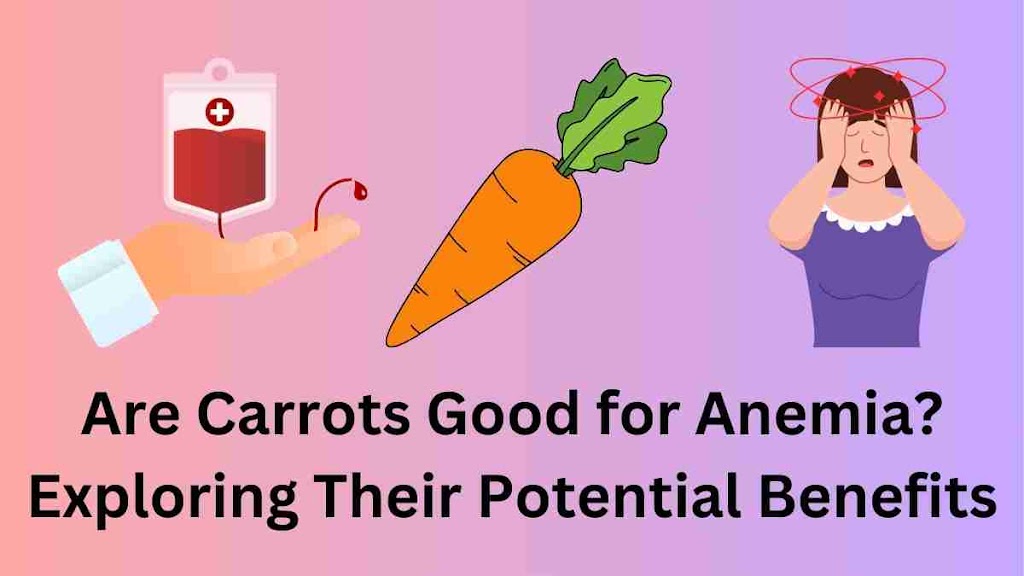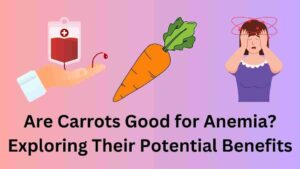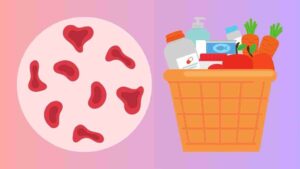Anemia, characterized by low red blood cell levels, can cause fatigue and weakness. Among dietary suggestions, carrots are considered a potential remedy. In this article, we investigate if carrots can help combat anemia and improve overall health.
Are Carrots Good for Anemia?
Yes, carrots can benefit individuals with anemia. While they don’t directly treat anemia, they contain iron and vitamin C, essential for improving iron absorption. Iron is crucial for producing hemoglobin, the protein in red blood cells that carries oxygen. Thus, adding carrots to a balanced diet can support overall health and aid in iron absorption for those with anemia.
What is Anemia?
Anemia indicates a problem with the body’s blood production or oxygen delivery system. Red blood cells, produced in the bone marrow, are essential for carrying oxygen to tissues and organs. Hemoglobin, a protein within these cells, binds to oxygen in the lungs and transports it throughout the body. When there’s a shortage of red blood cells or hemoglobin, the body struggles to meet its oxygen demands, resulting in anemia.
Causes of Anemia
Anemia can result from a range of factors, including nutritional deficiencies and chronic diseases. Iron deficiency anemia, the most common type, occurs when the body lacks sufficient iron for hemoglobin production. Similarly, deficiencies in vitamins like B12 and folate can lead to anemia due to their essential roles in red blood cell production. Chronic illnesses such as kidney disease or autoimmune disorders can disrupt red blood cell production or cause their excessive destruction, further contributing to anemia.
Symptoms of Anemia
Anemia often presents with subtle symptoms that can be mistaken for other conditions. Classic signs include fatigue, weakness, and pale skin, indicating the body’s struggle with oxygen deficiency. Shortness of breath, dizziness, and headaches may also occur, especially during physical activity. In severe cases, anemia can lead to chest pain, irregular heartbeats, and cognitive impairment.
Importance of Nutrition in Anemia Management
| Nutrient | Description |
|---|---|
| Vitamin A | Carrots are rich in beta-carotene, a precursor to vitamin A, essential for healthy vision, immune function, and skin integrity. Adequate vitamin A supports red blood cell production, crucial for efficient oxygen transport. Including carrots in meals helps fortify the body with this vital nutrient. |
| Iron | Though not as high as in other foods like leafy greens or red meat, carrots still offer a modest amount of iron necessary for hemoglobin formation and oxygen transport. Despite being non-heme iron, which is less readily absorbed, pairing carrots with vitamin C-rich foods enhances iron absorption, aiding in combating anemia. |
| Vitamin C | Carrots also provide a notable dose of vitamin C, acting as a powerful antioxidant and enhancing iron absorption. Pairing carrots with other vitamin C-rich foods like citrus fruits or bell peppers optimizes iron uptake, supporting efforts against anemia. |
How Carrots Can Help Combat Anemia
Carrots are not just delicious and crunchy; they’re packed with essential nutrients like iron, making them a versatile option for fighting anemia. Incorporating carrots into your diet can effectively combat this condition.
| Aspect | Role of Carrots |
|---|---|
| Managing Anemia | Carrots aid in ensuring adequate iron absorption, crucial for managing anemia. They are rich in vitamin C, which facilitates the absorption of non-heme iron from plant-based foods. Pairing carrots with iron-rich foods like spinach or lentils optimizes iron absorption and increases iron levels in the body. |
| Supporting Red Blood Cell Production | Carrots significantly contribute to red blood cell production due to their high folate content, essential for DNA synthesis and cell division. They also provide B vitamins like vitamin B6, necessary for hemoglobin synthesis. Integrating carrots into meals provides the necessary building blocks for robust red blood cell production, helping mitigate the effects of anemia. |
| Enhancing Immune Function | Carrots enhance immune function through beta-carotene, which converts to vitamin A, supporting immune cell activity and mucosal integrity. They also contain phytonutrients and antioxidants like lutein and zeaxanthin, which contribute to overall immune resilience. Incorporating carrots into the diet not only combats anemia but also strengthens the body’s defenses against infections and diseases, promoting long-term health. |
Incorporating Carrots into Anemia Diet Plans
To combat anemia effectively, incorporating carrots into your diet can be incredibly beneficial. Here are some creative ways to do so:
Carrot and Orange Smoothie: Kickstart your day with a nutrient-packed breakfast by blending carrots and oranges into a refreshing smoothie.
Carrot Additions for Lunch: Enhance the texture and flavor of your salads or wraps by tossing in shredded carrots for a crunchy bite.
Roasted Carrots for Dinner: As a side dish for dinner, roast carrots with a drizzle of olive oil and a sprinkle of herbs for a delicious and nutritious accompaniment.
Carrots in Cooking: Add carrots to soups, stews, and stir-fries to infuse color, flavor, and nutritional value into your meals.
Experiment with different recipes and cooking methods to maximize the benefits of carrots in your anemia diet plan while promoting overall health.
Other Nutrients for Anemia Management
Anemia, caused by low red blood cells or hemoglobin, can drain energy and impact health. While iron is commonly associated with treating anemia, other nutrients also play important roles. Let’s explore these lesser-known but equally vital nutrients.
Iron-Rich Foods Beyond Carrots
Iron is essential for addressing anemia, but relying solely on carrots is oversimplifying. There’s a variety of iron-rich foods to explore. Spinach is rich in iron and contains vitamin C, aiding absorption. Dark chocolate, lentils, tofu, and quinoa are alternative sources. Diversifying iron intake adds variety and enhances nutritional profile for a balanced diet.
Leafy Greens
Leafy greens are rich in iron, folate, and vitamin B12, making them effective in managing iron deficiency anemia. Kale, collard greens, and Swiss chard are particularly beneficial for addressing this condition. Including these greens in your meals, such as salads, stir-fries, or smoothies, boosts iron levels and provides essential nutrients for overall health.
Leafy greens offer various health benefits beyond anemia management. They are low in calories but packed with vitamins, minerals, and antioxidants, making them an excellent addition to any diet aiming for optimal health and vitality.
Legumes
Legumes like beans, lentils, and chickpeas are rich in iron, protein, and fiber, making them valuable for nutrition. Incorporating legumes into meals not only boosts iron intake but also provides sustainable energy and promotes satiety, particularly beneficial for managing anemia-related fatigue. From hearty bean stews to vibrant salads and creamy hummus, legumes offer diverse culinary options to enhance health.
Lean Meats and Seafood
While plant-based sources of iron are plentiful, lean meats and seafood are essential for managing anemia due to their high bioavailability.Incorporating lean meats like chicken, turkey, and beef, as well as seafood such as fish and shellfish, can significantly boost iron levels, especially for those with higher iron needs or difficulty meeting them through plants alone.
To maximize the benefits of these nutrient-rich options, prioritize lean cuts and choose cooking methods that minimize added fats and oils. Balancing lean meats, seafood, and plant-based sources of iron ensures comprehensive anemia management and promotes overall health.
Vitamin C-Rich Foods to Pair with Iron Sources
Vitamin C enhances iron absorption, making it vital to consume alongside iron-rich foods. Here are some options to complement your iron intake:
-
Citrus Fruits: Oranges, grapefruits, lemons, and limes are rich in vitamin C. Drinking freshly squeezed orange juice with iron-rich meals can enhance iron absorption and boost immune function.
-
Bell Peppers: Colorful bell peppers, including red, yellow, and green varieties, are excellent sources of vitamin C. Adding sliced bell peppers to salads, stir-fries, or enjoying them raw provides a flavorful and nutritious way to increase your vitamin C intake and aid iron absorption.
-
Broccoli: Broccoli is a versatile vegetable that packs a nutritional punch. In addition to being high in vitamin C, broccoli is rich in iron, folate, and fiber. Whether steamed, roasted, or added to pasta dishes, incorporating broccoli into your diet can promote healthy iron levels and overall well-being.
Considerations and Precautions
Incorporating carrots into your diet requires moderation. Despite their nutritional value, excessive consumption can have consequences. Here are key considerations and precautions to enjoy carrots’ benefits without adverse effects.
Carrot Consumption in Moderation
Carrots are packed with essential nutrients like beta-carotene, fiber, and potassium, offering numerous health benefits. However, it’s crucial to consume them in moderation. Excessive intake can cause carotenemia, a harmless condition where the skin turns yellow-orange due to high beta-carotene levels. Incorporate carrots into your meals sensibly for optimal health.
Monitoring Sugar Intake
While carrots are low in calories and fat, they do contain natural sugars. For individuals monitoring their sugar intake, especially those with diabetes or insulin resistance, it’s essential to be mindful of the carbohydrate content in carrots. Pairing carrots with protein or healthy fats can help mitigate any potential spikes in blood sugar.
Potential Allergies
Some individuals may have a rare allergy to carrots, known as oral allergy syndrome. Symptoms typically include itching or swelling in the mouth, throat, or lips after consuming raw carrots. In severe cases, hives, difficulty breathing, or anaphylaxis may occur. If you suspect a carrot allergy or experience adverse reactions, consult an allergist for evaluation and guidance.
Consulting a Healthcare Professional
Before making any significant changes to your diet, it’s advisable to consult with a healthcare professional, especially if you have existing health conditions or dietary restrictions. A registered dietitian or nutritionist can provide personalized guidance tailored to your individual needs and goals.
Tailoring Diet Plans
Every individual’s dietary needs and preferences vary. When adding carrots to your diet, consider your overall nutritional requirements and tastes. Whether you follow a specific diet like paleo, keto, or vegan, or aim for a balanced diet, adjust your carrot intake accordingly. Try various cooking methods and recipes to find what works best for you.
Addressing Individual Nutritional Needs
Including carrots in your diet is beneficial, but it’s important to eat a variety of foods to meet all your nutritional needs. Aim for a well-rounded diet with fruits, vegetables, whole grains, lean proteins, and healthy fats to optimize your health while enjoying the versatility of carrots in your meals.
Frequently Asked Questions For Can carrots help with anemia?
Can carrots help with anemia?
Carrots contain iron, essential for red blood cell production. However, they aren’t a primary iron source compared to meat or fortified cereals. While adding carrots to a balanced diet can boost overall iron intake, they may not be adequate alone to address anemia.
How do carrots contribute to managing anemia?
Carrots contain iron, which is a key component of hemoglobin, the protein in red blood cells that carries oxygen throughout the body. Additionally, carrots are rich in vitamin C, which enhances iron absorption. Incorporating carrots into meals alongside other iron-rich foods can help support the body’s ability to produce healthy red blood cells.
How do carrots contribute to managing anemia?
Carrots contain iron, a vital component of hemoglobin, the protein in red blood cells that transports oxygen throughout the body. Additionally, they are rich in vitamin C, which boosts iron absorption. Including carrots in meals with other iron-rich foods can support the body’s production of healthy red blood cells.
How should carrots be prepared to maximize their benefits for anemia?
To maximize the nutritional benefits of carrots for anemia, it’s best to consume them raw or lightly cooked. Cooking carrots can result in a loss of nutrients, such as vitamin C and folate. Enjoying them raw in salads or as a crunchy snack, or lightly steaming them, can help preserve their nutritional content.
Can eating too many carrots lead to iron overload?
While carrots contain iron, the body typically absorbs less iron from plant-based sources like carrots compared to animal sources. Individuals with conditions such as hemochromatosis should monitor their iron intake from all sources, including carrots.
Conclusion
While carrots contain iron and other nutrients beneficial for overall health, they may not provide sufficient amounts to effectively treat anemia alone. However, incorporating them into a balanced diet rich in iron sources can contribute to overall well-being and may complement traditional anemia treatments.




